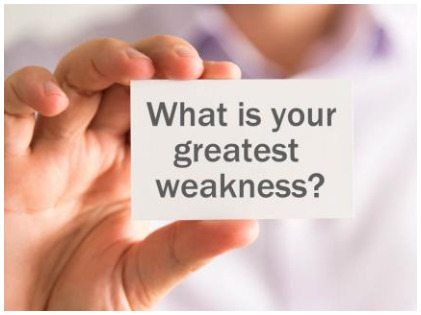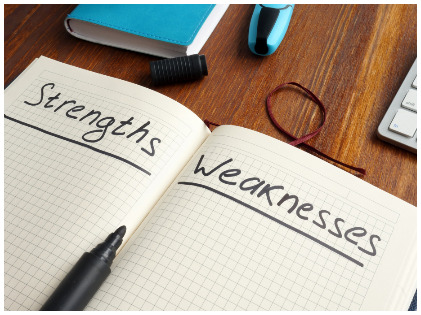
Your Guide To Answering the Dreaded Interview Question: “What Are Your Weaknesses?”

 Let’s all admit it – nobody feels comfortable when they’re asked about their weaknesses, most especially when it is asked during an interview! Just the idea of having a panel of interviewers staring at you as you respond can make you queasy, but that’s why we are here to help! This is one of the most common questions to be asked during an interview, so you have to prepare for it. We’ll guide you through the ins and outs of this question so that you can tackle it with confidence and leave the interviewers impressed!
Let’s all admit it – nobody feels comfortable when they’re asked about their weaknesses, most especially when it is asked during an interview! Just the idea of having a panel of interviewers staring at you as you respond can make you queasy, but that’s why we are here to help! This is one of the most common questions to be asked during an interview, so you have to prepare for it. We’ll guide you through the ins and outs of this question so that you can tackle it with confidence and leave the interviewers impressed!
Why You Need To Answer This Question Well
This is typically an unavoidable question. However, statistics do show that most people do not answer this question correctly or adequately. And if you know how to answer it well, it will be one of the ways that will make you stand out from the other interviewees. You want to land this job, so you have to prove that you’re the best candidate, and answering better than the rest is how you have to do it at the interviewing stage. Answering this question well also displays that you are self-aware and that you are able to criticize yourself analytically and improve on your own skills. It also simply shows your willingness to address your weaknesses and more importantly, displays how well you respond under pressure.
Why Is This Question Asked At All?
 It can seem rather counterintuitive that you’re sitting there, trying to deliver your best self, and the panel goes ahead and asks you to talk yourself down. Well, interestingly, interviewers can actually gather a lot of insight about you from this simple question than you imagine. It is a question that is effective at prompting interviewees to think about themselves deeply. There are many reasons interviewers ask this question such as to gauge your personality and character or your self-awareness as well as your ability to analyze and criticize yourself. Also, they could be simply checking that you don’t have a critical flaw that will affect your potential to fulfill the role you are applying for. They also are interested in seeing whether you are actually willing to work on yourself. If you happen to panic when faced with this question, it offers the panel an insight into what your performance might be like under pressure. So if the position you are applying for entails pressure and you don’t answer well, you can guess what will happen!
It can seem rather counterintuitive that you’re sitting there, trying to deliver your best self, and the panel goes ahead and asks you to talk yourself down. Well, interestingly, interviewers can actually gather a lot of insight about you from this simple question than you imagine. It is a question that is effective at prompting interviewees to think about themselves deeply. There are many reasons interviewers ask this question such as to gauge your personality and character or your self-awareness as well as your ability to analyze and criticize yourself. Also, they could be simply checking that you don’t have a critical flaw that will affect your potential to fulfill the role you are applying for. They also are interested in seeing whether you are actually willing to work on yourself. If you happen to panic when faced with this question, it offers the panel an insight into what your performance might be like under pressure. So if the position you are applying for entails pressure and you don’t answer well, you can guess what will happen!
Answering the Question
Right, we’ve gotten to the good stuff now – selecting the weaknesses you should mention. You have to select a weakness that won’t be damaging to your credibility but also one that is believable. Do not select a weakness that is fundamental to the position you are being interviewed for – for obvious reasons! Your weakness also needs to be relevant to the job at hand at the same time which means it needs to be professional incompetence (not, for example, that you can’t quite touch your toes when you do yoga). More importantly, the weakness you choose to pose to the panel must be one that is easily corrected, something that you can work towards improving. So, with all of this in mind, select a weakness and don’t forget to also offer your solution on how you will be addressing your weakness. Discuss, in summary, how you plan to improve on your weakness or weaknesses. With some clever thinking, you could even turn your weakness into a strength – see what we mean in the sample answers below!
Sample Answers
 For a position that requires teamwork and interaction, you could present that your weakness is that you find it challenging to remain motivated when you feel isolated in your work or when you cannot learn more from those around you. This will mean that your weakness is negated by the fact that the position will have you interacting in a team. Or consider a position where you will be at a desk, analyzing data and figures and have nothing to do with customer interaction. In this case, you could present that your weakness is that you have poor skills in client communication, your skills require some work, and you are more comfortable analyzing data. Just don’t forget to show keenness in improving those skills! Another example is speaking about how at the beginning of your career, you took on too many projects and dropped the ball, but then add how attending time-management seminars helped you manage your workload.
For a position that requires teamwork and interaction, you could present that your weakness is that you find it challenging to remain motivated when you feel isolated in your work or when you cannot learn more from those around you. This will mean that your weakness is negated by the fact that the position will have you interacting in a team. Or consider a position where you will be at a desk, analyzing data and figures and have nothing to do with customer interaction. In this case, you could present that your weakness is that you have poor skills in client communication, your skills require some work, and you are more comfortable analyzing data. Just don’t forget to show keenness in improving those skills! Another example is speaking about how at the beginning of your career, you took on too many projects and dropped the ball, but then add how attending time-management seminars helped you manage your workload.
You no longer have to fear this dreaded interview question – it’s all a matter of confidence, faith, and plenty of thinking. Put yourself in the interviewer’s shoes and get to that five-star answer you are looking for!
More in Big Bank Accounts
-
`
Why 50-Year-Olds Are Looking for a Career Change
In today’s fast-paced and ever-evolving job market, it’s not uncommon to see individuals in their 50s embarking on new career paths....
November 20, 2023 -
`
Why Mortgage Demand Is Crashing as Interest Rates Skyrocket
Imagine having a favorite local ice cream shop that suddenly jacked up its prices by 50%. You would probably think twice...
November 18, 2023 -
`
Santo Spirits | Sammy Hagar and Guy Fieri’s Joint Venture
In the world of entrepreneurial partnerships, some unions are destined for greatness. The unexpected alliance between Sammy Hagar, the iconic Van...
November 12, 2023 -
`
Branded Content: A Genuine Way to Connect With Your Audience
Have you ever binge-watched a series on Netflix, only to later realize that the beverage everyone’s sipping on is that brand...
November 3, 2023 -
`
Southwest Airlines Tackles Passenger and Labor Challenges
Southwest Airlines, a prominent player in the aviation industry, has found itself at a crossroads, facing a combination of passenger dissatisfaction...
October 28, 2023 -
`
Everything You Need to Know About Blended Interest Rates
Hou ever blended a smoothie and thought, “How on Earth do my strawberries, spinach, and protein powder come together to taste...
October 17, 2023 -
`
The Osbournes ‘Relaunch’ Podcast After 5 Year Break
If you were glued to your TV in the early 2000s, there is no way you missed the hilarious, raucous, and...
October 10, 2023 -
`
Tesla in China: Back-to-Back Price Drops, But No Sales Jump?
As temperatures soared in the summer of 2023, Tesla seemed to be heating things up in the Chinese market too. A...
October 6, 2023 -
`
Navigating Red Flags in the Workplace
In the journey of our careers, it’s not uncommon to encounter red flags in our jobs that signal potential issues or...
September 30, 2023















You must be logged in to post a comment Login